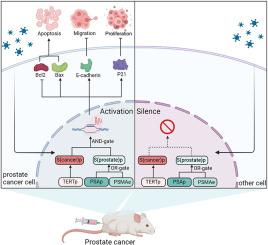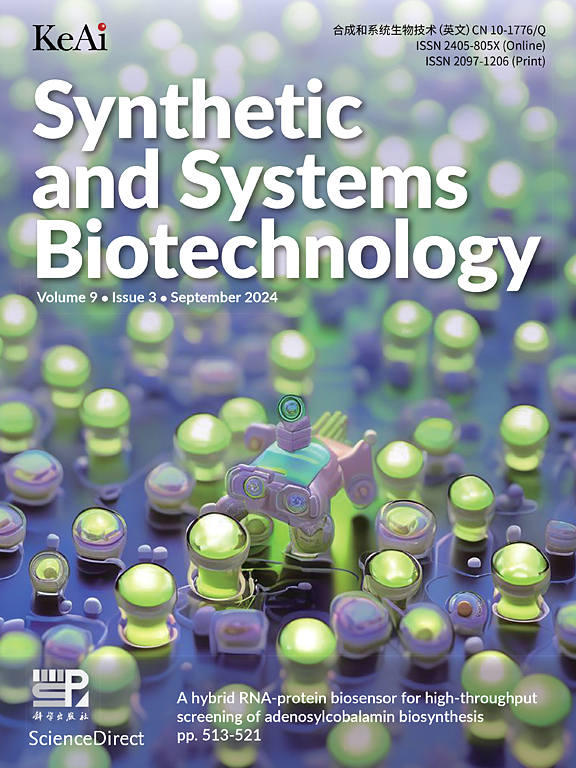A smart gene circuit for precise regulation of tumor cell behavior
IF 4.4
2区 生物学
Q1 BIOTECHNOLOGY & APPLIED MICROBIOLOGY
引用次数: 0
Abstract
Personalized gene circuit is a robust mode of cellular regulation that can manipulate intracellular gene expression to achieve desired functional regulation. However, the construction of logic circuits that automatically sense the characteristics of a particular environment within a cell is often difficult and lacking in sensitivity. Here, we synthesize from scratch specific promoters capable of sensing in cells, and use the combination of different types of promoters to construct smart gene circuits that can regulate gene expression in specific cell types sensitively. In detail, the tumour-specific promoter and the prostate tissue-specific promoter were constructed to be combined together into generating an artificial AND-gate gene circuit using the CRISPR-Cas9 system which could identify prostate cancer selectively. We then utilized this artificial gene circuit to drive targeted genes expression, such as P21, E-cadherin and Bax, to inhibit multifunctional prostate cancer cells but not other cells. Moreover, we applied gene circuits to redirect endogenous genes within cells and significantly and specifically suppressed the tumor growth of prostate cancer in vivo. Overall, these results highlight the clinical potential of these gene circuits as specific tools for prostate cancer detection and treatment, which is a new method for specifically reprogramming prostate cancer cells in vivo and may serve as a promising treatment strategy.

精确调控肿瘤细胞行为的智能基因回路
个性化基因回路是一种强大的细胞调控模式,可以操纵细胞内基因表达以实现所需的功能调控。然而,在细胞内自动感知特定环境特征的逻辑电路的构建通常是困难的,而且缺乏灵敏度。在这里,我们从无到有地合成了能够在细胞中感知的特异性启动子,并利用不同类型启动子的组合构建了智能基因回路,可以敏感地调节特定细胞类型中的基因表达。具体而言,构建肿瘤特异性启动子和前列腺组织特异性启动子,利用CRISPR-Cas9系统将它们组合在一起,形成一个人工and -gate基因回路,可以选择性地识别前列腺癌。然后,我们利用这种人工基因回路驱动P21、E-cadherin和Bax等靶向基因的表达,抑制多功能前列腺癌细胞而非其他细胞。此外,我们利用基因回路在细胞内重定向内源性基因,在体内显著特异性抑制前列腺癌的肿瘤生长。总之,这些结果突出了这些基因回路作为前列腺癌检测和治疗的特异性工具的临床潜力,这是一种在体内特异性重编程前列腺癌细胞的新方法,可能是一种有前景的治疗策略。
本文章由计算机程序翻译,如有差异,请以英文原文为准。
求助全文
约1分钟内获得全文
求助全文
来源期刊

Synthetic and Systems Biotechnology
BIOTECHNOLOGY & APPLIED MICROBIOLOGY-
CiteScore
6.90
自引率
12.50%
发文量
90
审稿时长
67 days
期刊介绍:
Synthetic and Systems Biotechnology aims to promote the communication of original research in synthetic and systems biology, with strong emphasis on applications towards biotechnology. This journal is a quarterly peer-reviewed journal led by Editor-in-Chief Lixin Zhang. The journal publishes high-quality research; focusing on integrative approaches to enable the understanding and design of biological systems, and research to develop the application of systems and synthetic biology to natural systems. This journal will publish Articles, Short notes, Methods, Mini Reviews, Commentary and Conference reviews.
 求助内容:
求助内容: 应助结果提醒方式:
应助结果提醒方式:


